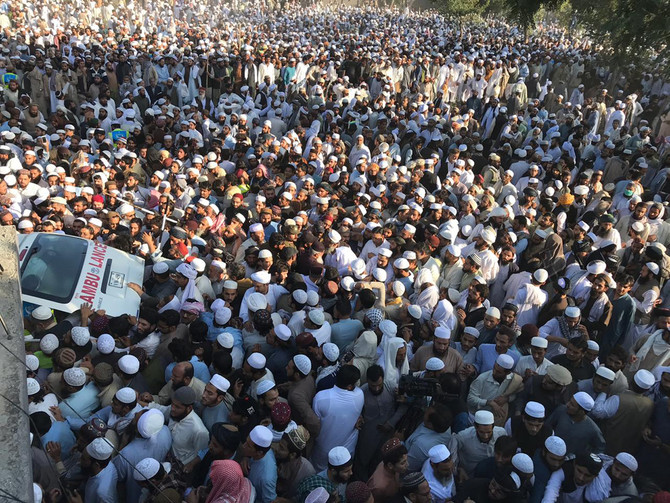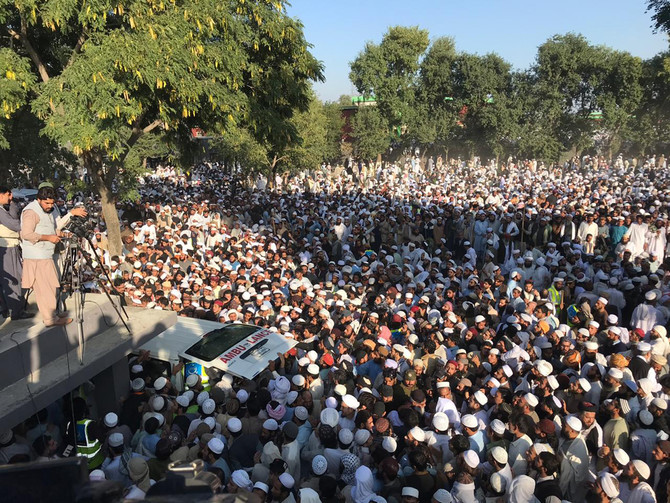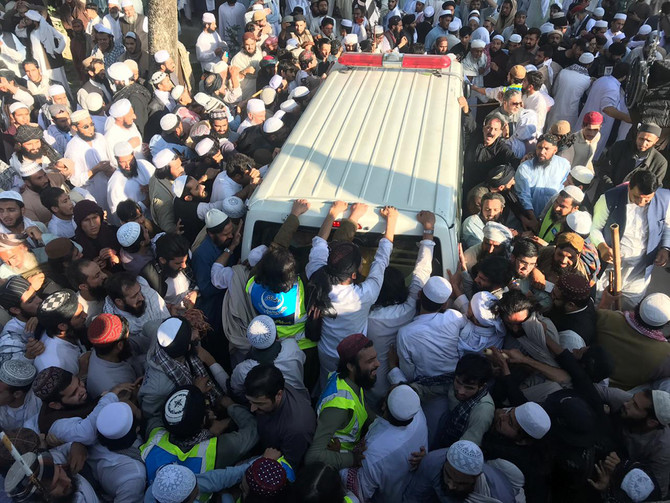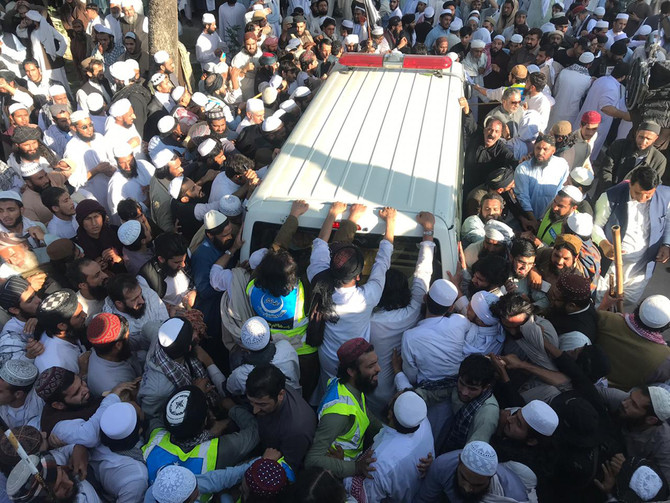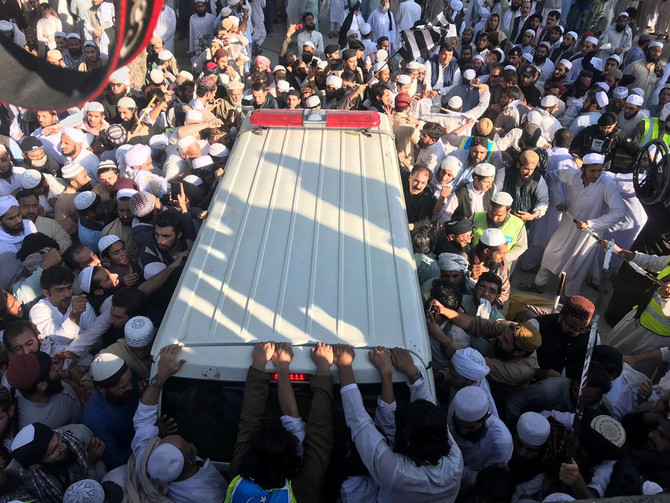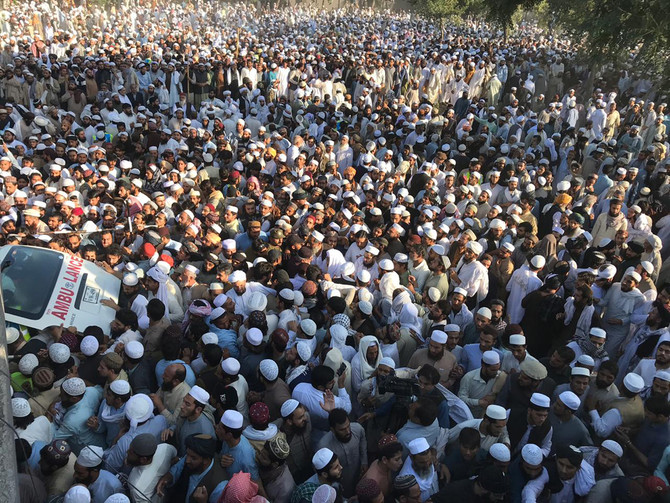KARACHI: Thousands turned out on Saturday to attend the funeral prayers of Maulana Sami-ul-Haq, a pro-Taliban cleric who was stabbed to death at his Rawalpindi residence a day earlier.
The funeral, where a majority of the attendees were students from Islamic seminaries, was held in Haq’s hometown of Akora Khattak, and lead by his son, Maulana Hamid-ul-Haq.
Influential religious scholars, senators and political leaders were also part of the congregation that had amassed to pay their last respects to the popular leader of Jamiat Ulema-e-Islam Sami (JUI-S). Haq was laid to rest besides the grave of his father, Maulana Abdul Haq.
“Based on the intelligence, we have gathered, over fifty thousand attended the funeral,” district police chief Mansoor Aman, told Arab News, adding that strict security measures were in place to avoid any untoward incidents.
Earlier in the day, the JUI-S elected Haq’s brother Maulana Anwar-ul-Haq as the party’s administrator, while his son, Hamid-ul Haq, was appointed as the deputy administrator of Darul Uloom Haqqania, the seminary which Haq headed and referred to as “a nursery of the Taliban”.
In Rawalpindi, police officer Muhammad Jameel told Arab News that the FIR has been lodged against unknown assailants whereas several teams wee investigating the high-profile case.
“The investigations are underway. We are interrogating different people including the domestic staff. Anything can be shared upon the conclusion of investigations,” the official told, adding that CCTV footage of the housing society has been obtained to identify the suspects.
According to FIR seen by Arab News, Haq after addressing gatherings in Charsadda, in the Khyber Pakhtunkhwa province, left for his residence in Rawalpindi. “I was informed by his secretary, Ahmed Shah, that unknown persons had attacked Maulana Sahib and he is laying wounded in his room,” Haq’s son told the police.
“My father has been killed by enemies of Islam and Pakistan,” Hamid-ul-Haq said. As per the FIR, Sami-ul-Haq was stabbed 12 times in his stomach, chest, forehead and ear at 6.30pm on Friday.
He added that the cleric’s driver and guard way away for 15 minutes and returned to find Haq dead. According to reports, the domestic staff has apprised police about two visitors. The police, however, have declined to confirm the information.
Meanwhile, Pakistan’s President Dr Arif Alvi and Army Chief General Qamar Javed Bajwa “expressed sorrow and grief over the martyrdom of Maulana Sami-ul-Haq”.
On Saturday morning, the Afghan Taliban also issued a statement, extending their condolences to Haq’s “family, party workers, religious circles and Muslim Ummah.”
“Shaheed (martyr) Maulana Sami-ul-Haq had devoted his entire life to serve religion through education and politics, and he got martyred in the same way,” Zabihullah Mujahid, the Taliban spokesperson, said.
Haq was born on December 18, 1937, at Akora Khattak and grew up in the spiritual surroundings of Darul Uloom Haqqania. He would assist his mother and grandmother in preparing food for the madrassa’s or Islamic seminary’s students.
After completing his basic education from Darul Uloom Haqqania, he obtained a degree from Dars-e-Nizami before moving to Qasimul Uloom Lahore where he received a degree in the commentary of the Qur’an from Maulana Ahmad Ali Lahori.
“I have the honor of being awarded a degree of honor from Medina University of Saudi Arabia and from Darul Uloom Deoband, India,” Sami-ul-Haq had written in his book.
After graduation, he was appointed as a faculty member at the Darul Uloom Haqqania and assigned the administrative responsibilities of the seminary after his father was elected as a member of the parliament in 1970. “I continued to assist my father till his death in 1988,” excerpts from the book read.
Following the demise of his father, Haq was appointed as the chancellor of the Haqqania in 1988 -- a position which he continued to serve until he was killed on Friday. He was chief of his own faction of the JUI-S and served as a member of Majlis-e-Shura of General Ziaul Haq from 1983-1985. In 1985, he was elected as a member of Pakistan’s Senate where he served for two terms.
Thousands bid farewell to Maulana Sami-ul-Haq
Thousands bid farewell to Maulana Sami-ul-Haq

- Former JUI-S leader was stabbed to death at his residence on Friday
- Brother and son appointed in key roles by the party
Four paramilitary soldiers killed by firing, IED blast in northwest Pakistan— police

- Levies personnel were in Dera Ismail Khan district from Balochistan to retrieve stolen vehicle, say police official
- Pakistan has suffered a surge in attacks in KP province since November 2022 after its truce with Pakistani Taliban ended
PESHAWR: Four soldiers of the paramilitary Levies force were killed after they were targeted by firing and an improvised explosive device (IED) blast in northwestern Pakistan’s Dera Ismail Khan district, a police officer said on Sunday.
According to D.I. Khan police officer Amer Khan, the four Levies personnel were in the district from southwestern Pakistan’s Khanozai area to retrieve a stolen truck.
Noor Ahmad Naib, Rasheed Zaman, Dawood Khan and Bilal Ahmad left for DI Khan on Feb. 1, the police officer said, adding that their vehicle was attacked in the district’s Daraban area.
“Upon initial reports, all embraced martyrdom due to firing followed by an IED blast,” Khan told Arab News.
So far no group has claimed responsibility for the attack but suspicion is likely to fall on the Tehreek-e-Taliban Pakistan (TTP) or the Pakistani Taliban, who have launched attacks on Pakistan’s security forces and law enforcement personnel for over a decade-and-a-half.
Pakistan has witnessed a surge in militancy in the northwestern Khyber Pakhtunkhwa province, which borders Afghanistan, since a fragile truce between the TTP and the state broke down in November 2022.
The TTP and other militant groups have stepped up their attacks against security forces, besides targeted killings and kidnappings of law enforcers and government officials, in recent months.
Islamabad has frequently accused neighboring Afghanistan of sheltering anti-Pakistan groups that launch cross-border attacks. Afghan officials deny allowing the use of their soil against any country.
The latest casualties in the province come a day after the military said 18 Pakistani soldiers were killed in a militant attack in southwestern Balochistan province. The military said it had killed at least 23 militants in subsequent clearance operations.
Pakistan president approves judges’ transfer to Islamabad High Court amid judiciary row

- News reports say government aims to appoint one of the transferred judges as Islamabad High Court’s chief justice
- Islamabad Bar Council criticizes move as “affront to the independence of the judiciary,” undermines rights of legal fraternity
ISLAMABAD: Pakistan’s President Asif Ali Zardari this week approved the transfer of three judges from the high courts of Sindh, Balochistan and Lahore to the Islamabad High Court (IHC), despite opposition from five IHC judges who had warned that the decision would not be in line with the constitution.
As per a notification from the Ministry of Law and Justice on Saturday, Zardari approved the transfers of Justice Sardar Muhammad Sarfraz Dogar from the Lahore High Court (LHC), the Sindh High Court’s (SHC) Justice Khadim Hussain Soomro and the Balochistan High Court’s (BHC) Justice Muhammad Asif to the IHC.
Local media reports had stated the government was considering transferring Justice Dogar as it wanted to elevate him to the post of IHC chief justice. Reports said incumbent IHC Chief Justice Aamer Farooq is expected to be elevated to the Supreme Court.
Five of the 10 IHC judges formally opposed Justice Dogar’s transfer on Friday. In a letter addressed to the chief justices of the Supreme Court, IHC, LHC and SHC, the judges said that if the decision to transfer the judge was to consider him as IHC chief justice, it would be “fraud on the constitution.”
In a notification released on Saturday, the Ministry of Law and Justice announced:
“In exercise of the powers conferred under clause I of Article 200 of the Constitution of the Islamic Republic of Pakistan, the President of the Islamic Republic of Pakistan is pleased to transfer:
Mr. Justice Sardar Muhammad Sarfraz Dogar, judge from the Lahore High Court to the Islamabad High Court, Mr. Justice Khadim Hussain Soomro judge from the Sindh High Court to the Islamabad High Court and Justice Muhammad Asif judge from the Balochistan High Court to the Islamabad High Court.”
Pakistan’s constitution empowers the president to transfer a judge from one high court to another after the concerned judge consents to the decision. The president can approve the transfer after consulting the chief justice of Pakistan and the chief justice of both high courts.
The Islamabad Bar Council unanimously rejected the president’s decision in a statement on Saturday.
“This decision is an affront to the independence of the judiciary and undermines the rights and representation of the legal fraternity in Islamabad,” the council wrote in a press release.
The council said it has convened an Emergent General House Session at 11:00 am on Sunday, along with the Cabinets of the Islamabad High Court Bar Association and the Islamabad District Bar Association, to deliberate on the “future course of action.”
“The Islamabad Bar Council urges the legal fraternity to unite in this critical time to uphold the sanctity of the judiciary and protect the interests of the Islamabad’s legal practitioners,” it added.
Pakistan’s FIA says key facilitator of Morocco boat tragedy arrested

- Several Pakistanis were on board migrant ship that sank off Morocco’s coast this month
- FIA says suspect Abdul Ghaffar involved in human smuggling in Mauritania, Burkina Faso
ISLAMABAD: The Federal Investigation Agency (FIA) this week announced it had arrested a human smuggler who was the main facilitator of the Morocco boat tragedy in which several Pakistanis were killed this month.
Pakistan’s foreign office confirmed earlier this month that a migrant boat with several Pakistanis had capsized near the coast of Morocco en route to Spain. According to Moroccan authorities, 36 people were rescued from the vessel, which had departed Mauritania on Jan. 2. The boat had 86 migrants on board, including 66 Pakistanis, minority rights group Walking Borders said.
Prime Minister Shehbaz Sharif had instructed the government to take stern action against human smugglers involved in sending desperate Pakistani citizens on dangerous journeys to Europe via sea.
“The main facilitator of the Morocco boat accident, Abdul Ghaffar, was arrested at Islamabad Airport yesterday,” a statement from the FIA said on Saturday, adding that it has traced the gang of human smugglers involved in the incident.
The investigation agency said Ghaffar had been living in Mauritania since 2023 and had facilitated sending several Pakistanis to Europe. It said the accused’s father, Muhammad Sarfraz and close relative Munir Ahmed are also involved in human trafficking in Mauritania since 2018.
FIA said it had nabbed Ghaffar when he arrived in Islamabad on Friday with seven passengers. After being identified by the passengers, he was taken into custody and shifted to Faisalabad.
“Important evidence was recovered from Adul Ghaffar, the agent involved in human trafficking,” the FIA said.
The agency said it has evidence Ghaffar was in contact with an African human smuggler named Abu Bakar. It said upon initial investigation the FIA found out that Ghaffar and his accomplices were actively involved in human smuggling in the African countries of Mauritania and Burkina Faso.
“The suspects helped Pakistanis onto boats by luring them with promises of sending them to Europe, which resulted in the deaths of several Pakistanis,” the agency said.
The FIA said a case has been registered against Ghaffar and further investigations are underway. The agency said it expected more arrests after extracting information from the suspect.
“Strict legal action will be taken against smugglers who play with innocent lives,” the FIA vowed.
The Morocco boat tragedy highlighted the perilous journeys many migrants, particularly Pakistanis, undertake due to conflict and economic instability in their home country.
In 2023, hundreds of migrants, including 262 Pakistanis, drowned when an overcrowded vessel sank in international waters off the southwestern Greek town of Pylos.
It was among the deadliest boat disasters ever recorded in the Mediterranean Sea.
Pakistan anti-graft body files reference against property tycoon over illegal transfer of Karachi land

- Malik Riaz Hussain and others are accused of having over 7,000 acres of government land transferred illegally to Bahria Town Karachi
- The development comes days after National Accountability Bureau said it had initiated process to seek Hussain’s extradition from UAE
KARACHI: Pakistan’s National Accountability Bureau (NAB) has filed a reference against real estate tycoon, Malik Riaz Hussain, and 32 other individuals over illegal transfer of government lands for a mega project in the southern Pakistani city of Karachi, a NAB spokesperson said on Saturday.
Hussain, who currently lives in Dubai, is one of Pakistan’s wealthiest and most influential businessmen and the country’s largest private employers. He is best known as the chairman of M/s Bahria Town, which claims to be Asia’s largest private real estate developer and has projects in Islamabad, Lahore, Karachi and other cities.
NAB filed the reference in an accountability court in Karachi nominating Hussain, his son Ahmed Ali Riaz, former Sindh chief minister Syed Qaim Ali Shah and Sharjeel Inaam Memon, then local body minister and now information minister of Sindh, among 33 people for illegally transferring government land to M/s Bahria Town for its Bahria Town Karachi project in 2013 and 2014.
“Accused persons in connivance with each other illegally transferred the government land, initialy admeasuring 7220 acres, to M/s Bahria Town,” the anti-graft body said in the reference. “The said illegal transfer of government land to Bahria Town was made under the garb of adjustment/exchange/consolidation.”
It said the accused persons acted as an “organized syndicate” to cause cumulative losses of Rs700 billion ($2.5 billion) to the national exchequer, requesting the court to try them for committing the “offenses of corruption and corrupt practices.”
The development came days after NAB said it had initiated the process to seek Hussain’s extradition from the United Arab Emirates (UAE), who was also charged in another land corruption case involving former prime minister Imran Khan and his wife.
A Pakistani court last month sentenced Khan to 14 years in prison and his wife, Bushra, to seven years, in the case in which they are accused of receiving land as a bribe from Hussain through the Al-Qadir charitable trust in exchange for illegal favors during Khan’s premiership from 2018 to 2022. Khan says he and his wife were trustees and did not benefit from the land transaction. Hussain too denies any wrongdoing relating to the case.
“We have written to the Federal Investigation Agency for the extradition,” a NAB spokesman told Arab News on Wednesday, adding that the FIA would now pursue the case.
Prior to that, Defense Minister Khawaja Asif confirmed that Pakistan would use its extradition treaty with the UAE to bring Hussain back.
Last month, NAB also cautioned people against investing in Hussain’s new real estate venture to build luxury apartments in Dubai.
“If the general public at large invests in the stated project, their actions would be tantamount to money laundering, for which they may face criminal and legal proceedings,” it said.
Hussain responded to NAB in a post on X, saying that “fake cases, blackmailing and greed of officers” had forced him to relocate from Pakistan because he was not willing to be a “political pawn.”
Pakistani PM hopes Sharaa assuming president’s office will bring peace to Syria

- Al-Sharaa was declared president for a transitional phase on Wednesday, less than two months after he led a campaign that toppled Bashar Assad
- Sharaa said he will form an inclusive transitional government that will build institutions and run the country until it can hold free and fair elections
ISLAMABAD: Pakistan Prime Minister Shehbaz Sharif on Saturday welcomed Ahmed Al-Sharaa’s assumption of the office of the Syrian president, hoping it would lead to peace in Syria.
Sharaa was declared president for a transitional phase on Wednesday, less than two months after he led a campaign that toppled Bashar Assad.
He was also empowered to form a temporary legislative council for a transitional period and the Syrian constitution was suspended.
“We welcome Mr. Ahmed Al-Sharaa’s assumption of office as President of the Syrian Arab Republic during the transitional phase and hope that the new leadership will be able to bring peace, progress and prosperity to the brotherly people of Syria,” Sharif said on X.

On Thursday, Sharaa said he will form an inclusive transitional government representing diverse communities that will build institutions and run the country until it can hold free and fair elections.
He was addressing the nation in his first speech since being appointed president by the military command that ousted Assad in a lightning offensive last year.
The group that led the offensive, Hayat Tahrir Al-Sham, has since set up an interim government that has welcomed a steady stream of senior Western and Arab diplomatic delegations keen to help stabilize the country after 13 years of civil war.





